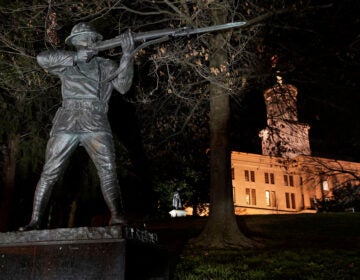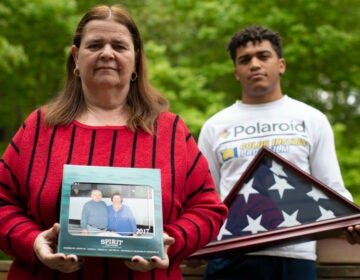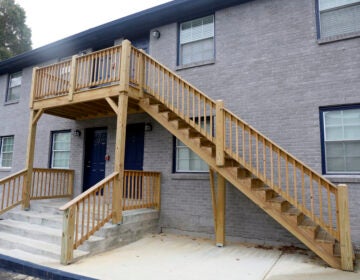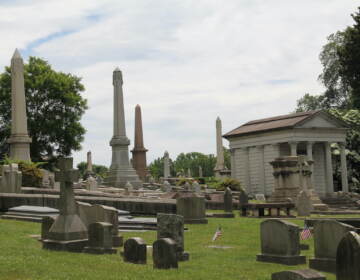Mysterious neighborhood war memorial reconnects WWI vet’s family
Powelton Village has been honoring its unknown WWI soldier for years. His descendants have now been found and will join the ceremony this year.

Joel Spivak holds an event in honor of a WWI at a small park at 37th Street and Powelton Avenue in West Philadelphia every Memorial Day. (Kimberly Paynter/WHYY)
The story of the memorial for Cpl. James Cochran shows that it may only take one man to honor the dead, but it takes a village to remember them.
For decades, Joel Spivak has spent Memorial Day bouncing among obscure war memorials in Philadelphia. He packs the trunk of his car with a broom and a boombox, and drives around to clean and remember spots that have become mostly forgotten.
He goes to 31st and Girard where a stone slab honors railroad workers who died while serving in the military. Spivak visits a stone marker at 48th and Lancaster in West Philadelphia that once had a plaque, but it either fell off or was stolen. He used to go to a brick wall memorial at 3rd and Bainbridge in South Philly, but it has been torn down for being unsafe.
Sometimes others join Spivak on his impromptu ceremonies, sometimes he is alone. Whether with a group or by himself, the ritual is the same.
“I come here, I put my boombox down. I play the national anthem. I read ‘In Flanders Fields,’” said Spivak, 81, referring to the famous poem written by the WWI doctor John McCrae. “I say something about people who served our country. I play ‘Taps’ and I go home.”
In Powelton Village, in the middle of a three-way intersection of Powelton Avenue, Lancaster Avenue, and 37th street, is a triangular median with a fenced-in garden. It contains a stone marker with a plaque honoring Cpl. James Cochran.
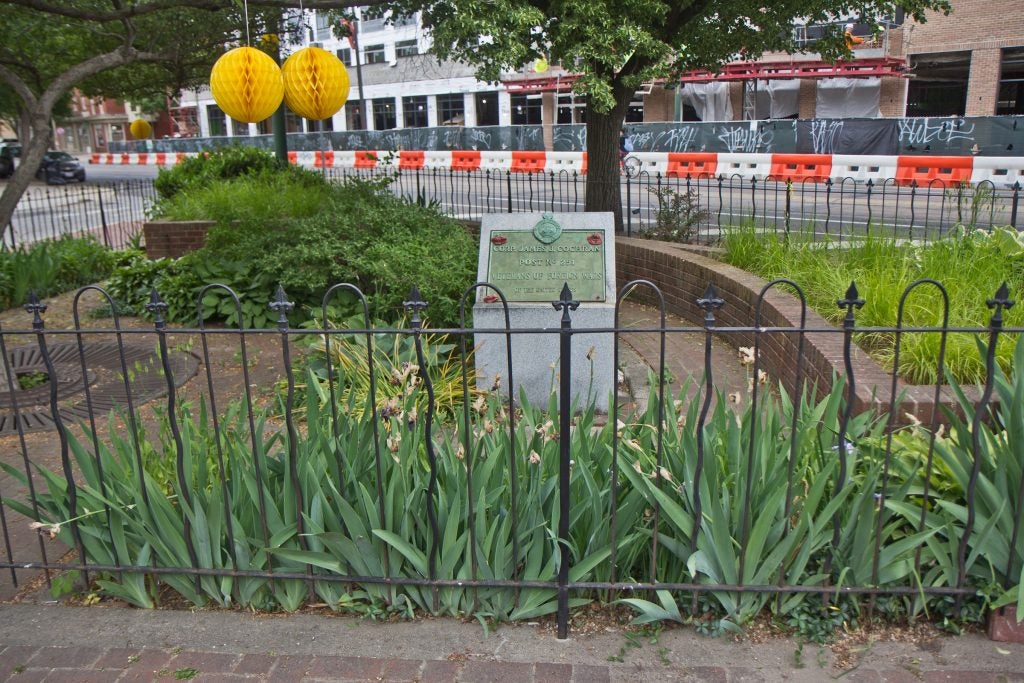
When Spivak started to stage annual ceremonies at the James Cochran memorial, he had no idea who Cochran was. The plaque is not inscribed with any dates and does not mention a specific war.
“It didn’t matter to me,” he said. “It was somebody who died in some war, somewhere.”
He put up flyers around the neighborhood to get more people to his ceremonies. As it turns out, the neighbors didn’t know who Cochran was, either.
“I kept asking: ‘So who’s this Cochran?’ Nobody really knew,” said Virginia Maksymowicz, an artist who lives nearby. “One of our neighbors had done some basic historical research on the name, but came up with a totally different family.”
About 13 years ago, when Maksymowicz had a job teaching at Franklin and Marshall College, she started using its library’s access to online historical records to see what she could find on Cochran.
She discovered Cochran was born in 1895 to an Irish Catholic family in West Philadelphia. He had two brothers and became an amateur boxer, and a pretty good one: Maksymowicz found newspaper articles about his fights. Cochran ultimately quit boxing at the urging of his mother. Maksymowicz found a document of his enlistment in the Army, which showed he was not married and at the time did not have a job. He was deployed overseas and died fighting in France.
“So bit by bit, you know, whenever I had time, I started just Googling to see what more would come up,” she said. “New stuff is scanned all the time.”
Then newspaper reporter Joseph Gambardello found out Cochran’s body was shipped back from France and buried at Holy Cross Cemetery, an Archdiocese of Philadelphia burial ground in Yeadon.
Maksymowicz turned to a friend Isabel Mandelbaum, whose sister had a subscription to the genealogical database Ancestry.com.
That connection, after a decade of slowly chipping away at historical records, yielded Cochran’s living descendants.
Cochran’s grand-niece and grand-nephew are Merce Wilczek, a retired graphic designer living in Dighton, Massachusetts, and her twin brother Bill Richardson of Summerville, South Carolina. They have a cousin, Stacie Allred, of Ruckersville, Virginia.
At Maksymowicz’s invitation, they are all traveling to Philadelphia this weekend to be part of the Memorial Day ceremony at their great-uncle’s marker on Lancaster Avenue.
“Virginia’s letter to us came out of the blue. They seem to know more about our family than we did,” said Wilczek in a phone interview from Massachusetts. “They were just so enthusiastic about locating us and finding some way to know more about James Cochran and the Cochran family. So we got very interested in this group in Powelton Village. We want to go for our uncle, but also to meet this great group.”
This will not be the first time they have visited the Cochran memorial. Wilczek and Richardson traveled to Philadelphia in 1952 as children to visit their grandmother, Cochran’s sister. Richardson recalled his grandmother worked at the Wannamaker’s department store and played on the employee basketball team. She kept a locket with James’ picture and a lock of his hair, which Wilczek now owns.
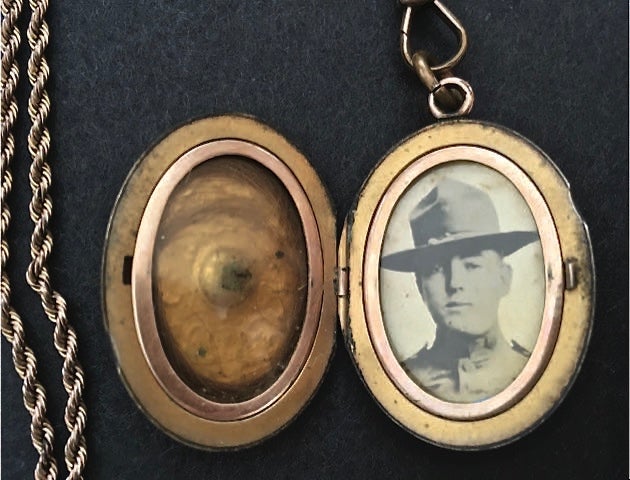
Their cousin Stacie remembered her grandmother never spoke about WWI, but often spoke about her brother.
“Our grandmother talked of him fondly, and she didn’t talk about the past very much at all. She talked of him with a lot of love, a tremendous amount of love,” said Allred. “I think he was the first person that I ever heard about that had died in a war, so that got into my little brain when I was young and has always been there.”
Allred visited the memorial on Lancaster Avenue three years ago, when she came into town for the Philadelphia Flower Show. This was before she was contacted by Maksymowicz. There was nothing happening at the memorial at the time, but she knew it was there.
Allred arrived alone in 2018, and found the memorial garden in the middle of a busy 3-way intersection. She saw it had a wrought iron fence around it, with well-tended plants and a small tree in the middle. Someone had knitted poppy flowers — the symbol of WWI armistice — and fixed them to the corners of the James Cochran plaque.
Allred got goosebumps.
“It brought joy to my heart. This man that my Gram talked about with a great deal of love and respect for the military — somebody was taking care of this and I wasn’t sure who it was,” she said. “It was just a great feeling that this town of Philadelphia, that my grandma grew up in and we had always heard about, the town had cared enough to take care of this. It just brought pride to me.”
This ceremony with the family has been long in the planning. They were supposed to come out last year, but the pandemic upended their travel plans.
In that time, the descendants have been doing their own genealogical projects. Bill Richardson’s daughter, Alexis Cherichetti, has put together an interactive map with photos and documents, tracing the life of James Cochran as his family moved around Philadelphia, his boxing bouts, the factory he briefly worked in as a machinist, his enlistment in the army and training in Georgia, and his deployment to Europe.
“I love maps. Having a sense of location and movement through time helps me process information,” Cherichetti wrote in her introduction to the story map. “The Powelton residents’ search for more information about James sparked my own interest in learning more about my great-grandmother’s brother.”
There are still many unknowns surrounding the Cochran memorial. Chiefly: Why is it there? The Cochran family does not have a connection to the Powelton neighborhood, and the VFW Post 251 — which does not exist anymore but presumably made the memorial — was not located there. And, why did the VFW post choose Cochran’s name for this memorial honoring veterans of foreign wars?
The mystery continues.

Get daily updates from WHYY News!
WHYY is your source for fact-based, in-depth journalism and information. As a nonprofit organization, we rely on financial support from readers like you. Please give today.



